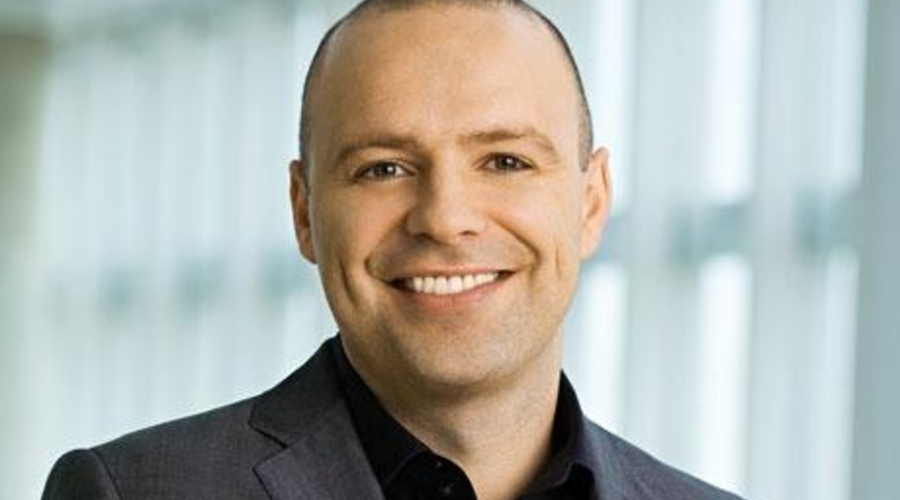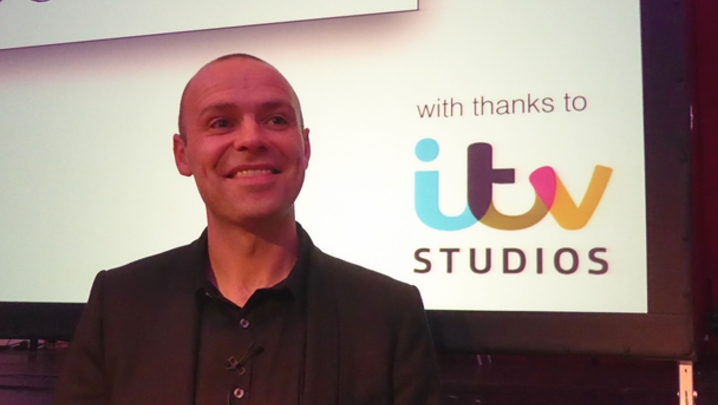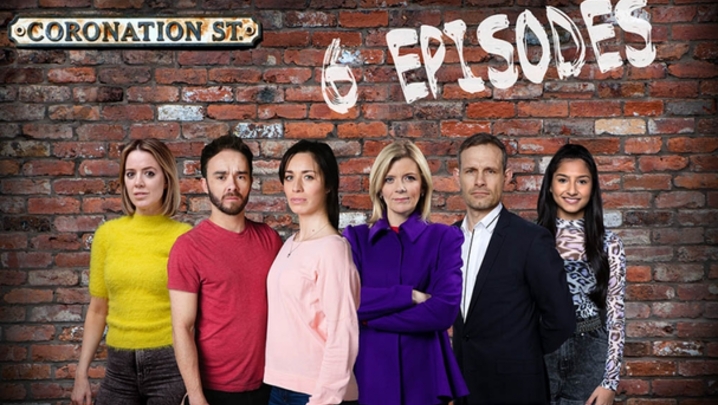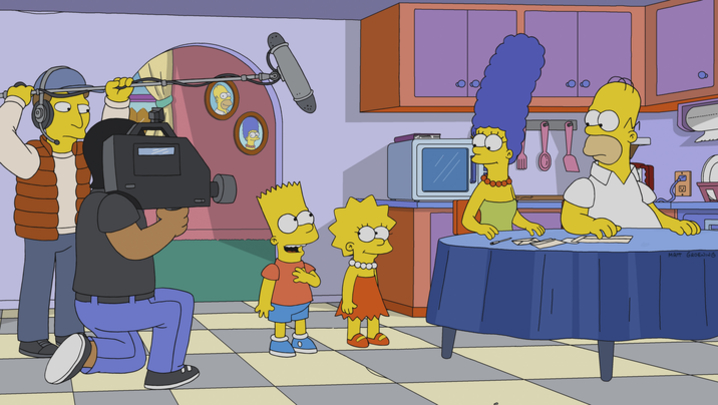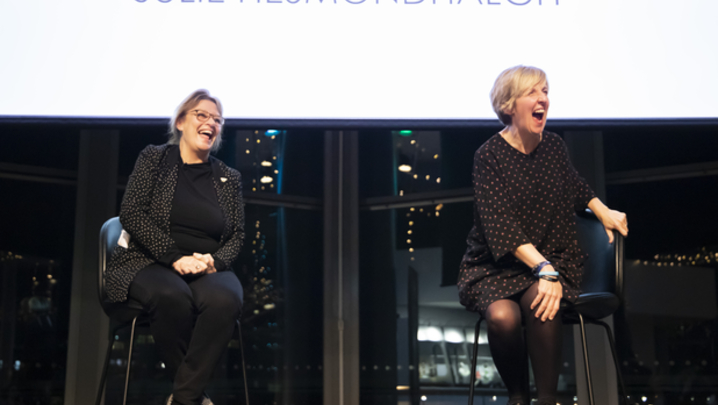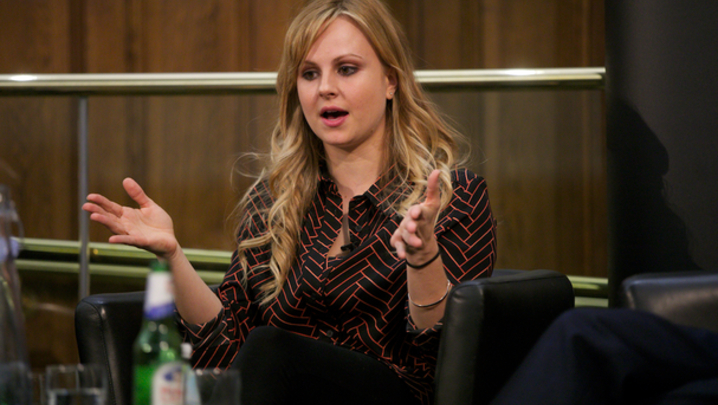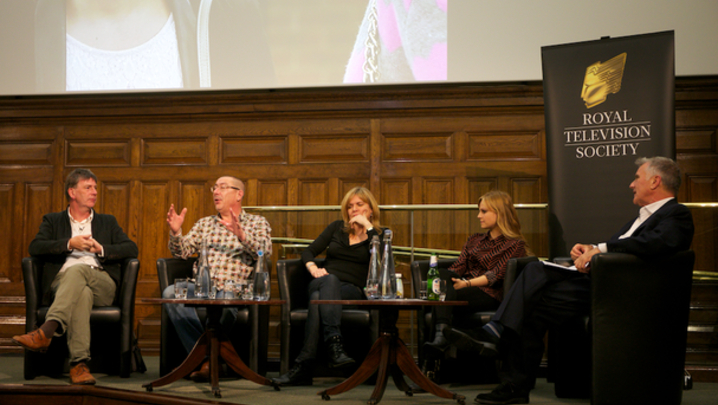Managing Director of ITV Studios UK, Julian Bellamy, delivered a keynote lecture to the RTS North East and Border centre.
Good evening. I’d like to start with an apology to Monica and Karen, our two signers tonight. They maybe from Signpost - our multi-award winning Gateshead-based signing business - but I bet they’ve not signed Anglo Saxon before….until tonight. Standby for a speech that can link Ant and Dec to the West Germanic version of Old English…yes, really.
I also want to thank The Cinema & Television Benevolent Fund for asking me to speak at the RTS this evening. I’m genuinely delighted to be here, especially since - as I’m sure you can tell from my accent - I have a family connection to the region…
40 odd years ago my dad worked for Tyne Tees – as a jobbing studio director in the light entertainment department. My older brother was born up the road in Ashington and our family lived a few miles away in Seaton Delavel.
We stayed in the North East for all of three years before my dad was moved onto his next tour of directorial duty at another ITV regional garrison town. Whether it was Newcastle, Carlisle, Bristol, Manchester or Dover, travel was a characteristic of my early life thanks to ITV…and 40 years on it still is, albeit with a lot more jet lag.
It is interesting just how much travelling I currently do. Not because there’s anything inherently fascinating in my perpetual motion life, but because of what it says about the world of TV and what it means for regions such as the North East.
But, before I get into the detail, some context: I believe three things about TV.
One – the business is fundamentally in great shape and for production companies like ITV Studios there are more opportunities then ever before to make great television.
Two – at its core, this a talent business and top talent is more in demand, more commercial, more mobile than it’s ever been – which means that our job is attracting and working with that talent where ever it happens to be.
And thirdly - difference is now the new norm. It is the era of distinctive voices. Increasingly the line of least resistance is the road to nowhere. And the successful production company is the one that can find and nurture distinctive, particular voices. These shifts, I believe, herald a new relevance and a new importance for regions such as the North East… or the North in general…. or the South West, for that matter anywhere distinctively outside London. Let me explain.
Time was when someone at ITV like me would sit in London… and the world, a much smaller world, would come to me. If I were to do that now I’d have an awful lot of time to admire the splendid views of the river Thames from my office and watch as the ITV Studios business model gently slipped into it.
These days the action is elsewhere – America, The Nordics, Israel and here in the UK, it’s often in non-metropolitan hubs, second or third cities, regional centres where there has been a conscious effort to use the media as a force for energetic regeneration. Places such as Manchester, Leeds, Bristol and, I hope to a growing extent, Newcastle and the North East region.

(Credit: ITV Studios)
Although I spent a chunk of my TV life at Channel 4 promoting regionalism, as Commissioning Editor for the Nations and Regions, I probably counted myself among the cynics when plans were first mooted to relocate a sizeable chunk of the BBC to Salford. I inwardly chuckled at stories in the back pages of Broadcast about the appalling lack of polenta in Didsbury or the BBC’s Head of The North living in the Home Counties. We’d all watched previous BBC initiatives wither and die due to the relentless gravitational pull that makes up London media-land. When Janet Street-Porter’s Yoof department was relocated to Manchester she operated a clear and consistent policy. People she didn’t like and people with beards had to move North, everyone else could stay in Shepherd’s Bush. So without any real heart in it or BBC will behind it Janet’s northern centre of youthful excellence, like all such initiatives didn’t last long against the inevitable magnetism of the capital.
And yet this time I’ve been proved wrong. Media City in Salford is thriving, not just as a home of swathes of the BBC but as a self sustaining, indeed burgeoning, home to substantial chunks of ITV schedule real estate. Last year ITV Studios daytime output from Manchester was 142 hours. This year it’s tripled to 432 hours. Last year there was no in-house drama coming from Manchester, this year we have two big series originated and produced there in Ray Winstone’s The Trials of Jimmy Rose and Midwinter of the Spirit. ITV has 900 people working in Media City, contributing to a vibrant out of London production community.
And it’s not just ITV Studios, who I stand here representing. But as you know ITV is more than just a producer it’s a network of channels and a huge commercial and creative force in our industry. And they choose to base a news team, a commercial team, CITV and many administrative and support services in Media City. And not to mention our huge, state-of-the-art production base for Coronation Street.
In fact I would argue ITV is a more accurate bell weather of the health of regional production than the BBC. The BBC had to do what they did and spend big in the regions, to justify a licence fee raised from the whole of the UK. ITV doesn’t. ITV is now largely able to do what suits ITV commercially. However the last few years have taught us that our bread, or indeed our polenta, doesn’t get buttered in London. The wellspring of what we do, the reason we connect with audiences, comes from ITV’s deep roots outside of London. Obligation has morphed into opportunity.
For example our much talked about UK acquisition strategy is not just about growth, revenue and increased production hours – as important as they are to us. It’s also about teaming-up with indies who fit with ITV Studios, who share our philosophy. So it’s no surprise that some of those acquired companies have regional roots. We’ve recently bought Two Four, a Plymouth-based factual indie with a substantial outpost in Cardiff. Its strength comes from its regionality. Two Four make, among many other top factual programmes, Educating Yorkshire. Significantly this is soon to be Educating America. Local goes global. For us at ITV regionality is increasingly seen as a key competitive advantage. In the past it would have just been another thing to tick off on the ITV licence “to do” list.
In the past ITV’s regional roots would have been tangible - physical studios, OB capability, smart Luton vans liveried with regional logos . These days our regional roots lie in intangible assets – talent mainly - writing talent, acting talent, directing talent, producing talent. And unlike the physical assets, what our new assets create is eminently transferable, locally sourced, globally attractive. The single biggest thing that keeps me awake at night …is talent: how to find it, how to work best with it and how to keep it in an increasingly global marketplace.
Take for example the scripted business. The international appetite for glossy new high-end drama has accelerated exponentially in the last few years. In the US alone this year there have been 400 drama series launched. The TV critic at The Huffington Post (Mo Ryan) described his job now as little more than triage - most of his time spent ploughing through endlessly incoming new TV series trying to work out what most needed critical attention. A snowstorm of quality. It was not ever thus.
What’s interesting about this scripted explosion and the age of Netflix, Amazon and bold channel brands is that it’s not about copycat, “me too” programming or bland cookie cutter formulas. As the British Head of a US network recently put it, the era of least objectionable programming is dead. Now the game is more about a genuine search for the different, the distinctive. It’s about individualism not homogenisation. It’s about a particular point of view, a particular section of society, a particular place. It’s like the world is done with the general and the average and now it wants the specific and the original. And that’s where very particular talent allied to a very special place comes in.
I think this is brilliantly illustrated by one of our new dramas Jericho. Set in the Yorkshire Dales in the 1870s and starring Jessica Raine, we hope this will be one of the drama series of next year.
I could also cite other examples of great series like Home Fires, set in Cheshire. Or Cradle to Grave, Midwinter of the Spirit and The Trials of Jimmy Rose all produced in Manchester. Or I could lay out how last week Mammoth Screen, an ITV Studios owned drama indie, has announced that their new eight-hour series on Queen Victoria will be the first production to use the facilities of the brand new Yorkshire Studios.
But I’m very aware that when TV execs publically cite success stories from “The North” they often just end up talking about the North West, not the North East.
So I think I'll use our drama Vera as a prime example of the conjunction of talent and place. Vera couldn’t have happened without the novels of Ann Cleeves who has put down roots in the North East. In a way, the landscape of Seaham, with its wide open skies and its unique mix of the wild and the post industrial is as much a driver of plot as the characters Vera investigates. In the series the landscape seems to do more than just reflect the inner life of the characters, it actually seems to motivate them both for good and for evil.
Consequently Vera doesn’t fit into anyone’s stereotype of what we might think of how the world views Britain. There isn’t a butler or maid in sight. Yet such is the appetite for the authentic and the specific, that Vera has found it’s enthusiastic international audience across 131 countries. In the US, not only does it go out on PBS, it is also widely watched on Hulu and Amazon. There was a time when American TV channels wouldn’t have touched the everyday grim of Vera or its North East accents with a barge pole. Now it’s called its USP. It is relished for its uniqueness, its grounded specificity.
Brenda Blethyn claims that she developed the character of Vera bottom up from a pair of second hand boots she bought 20 years ago for £12 and which she feels sums up the no-nonsense detective.
Her series certainly stamps a significant economic footprint in the region – if nothing else because, like a lot of ITV Studios productions, we now make a conscious but admittedly self-interested effort to employ local TV and film talent on our productions.
In Vera’s case, the series employs over 50 local people when shooting and uses over 40 local suppliers. The current director is a local lad. Jamie Childs grew up here, moved to London to direct ads and now has come back to do his first TV directing job. One day perhaps, talent like Jamie will be able to cut out the middle bit and just stay in the North. What is certain is that he has been hired to make the show more local, not less. On a practical level, he will no doubt take the series to nooks and crannies that only someone from here would be aware of. On a more indefinable level, he will infuse the series with a certain spirit, a feeling that can only come from one place and is exactly what gives Vera its uncompromising credibility.
It may surprise you that because of these opportunities, this year ITV Studios made around two thirds of our drama outside London and the South East. That doesn’t include our soaps. If I were to add the 293 hours of Coronation Street and Emmerdale we produced this year, that figure would go up to 92%. We do this not as a result of public service social engineering but because at ITV we have come to realise that….
(And bear with me for this…..)
Gǣð ā Wyrd swā hīo scel!
Excuse the rustiness of my Anglo Saxon accent but amid such a well-educated audience as this, I’m sure you get my gist. It’s a quote from the epic poem Beowulf. Fate goes ever as it must. And fate, together with huge help from local councils, film funds and a wealth of local talent, has led us to produce and reimagine Beowulf as a hugely ambitious 13-part drama series, based here in the North East in a quarry in Weardale.
Even for a company the size of ITV Studios, and we are now the largest commercial producer in the UK, Beowulf is a big bet. A multi-million pound bet on an epic TV adventure and a land where Thanes are Thanes and no one is anyone unless they’ve got a sword in their hand, a horse between their legs and great big furry mice for eyebrows… and the men look pretty fierce too.
And we aren’t just betting on a fantastic script and a brilliant cast. We are betting on the North East itself. Not just its extraordinary beauty, but also the people up here who have the skill and the commitment to make our make believe real, to realise our fantasy.
Last week I went to Cannes for MIPCOM with the sole of objective of persuading buyers from all around the world that they should buy Beowulf. And when I say buy, I don’t just mean pluck it off the shelf and then hide this obscure foreign drama in a time slot only ever seen by insomniacs. I mean: choose Beowulf as their big launch for winter. This is a high-end, brand defining show that we hope will play across the world.
Game of Thrones is estimated to have brought almost 90 million pounds directly and indirectly to the local Northern Irish economy. Doctor Who kick-started a film and media industry in Wales, which has seen 52%, increase in employment in the creative industries and is currently hosting another epic, The Bastard Executioner. Will Beowulf do the same for the North East. Well… Gǣð ā Wyrd swā hīo scel!
Fate goes ever as it must. In other words, it remains to be seen whether Beowulf will take off and be transformative. I also know that we in the TV industry are now streets ahead of where we used to be in terms of seeing the value in and then mining the value out of what we produce.
When Heartbeat was filmed on the North York moors the most exploitation of the show you were likely to find would be some nic nacs in a souvenir shop in Whitby. Maybe a rubber with a police helmet on it. Or a teapot with Nick Berry’s face plastered across it. In contrast high end Game of Thrones gold jewellery is a big thing now with exclusive pieces going for hundreds of pounds, all made by the local jeweller in Ireland who makes the costume jewellery for the series. Under my trousers I’m currently trialling a Beowulf branded Norse hero thong soon to be on sale across the world. If all goes well.
Seriously, just as major drama series have gone more local, their audiences and so their means of funding, have gone more global. We hope dollars, Euros, shekels and zlotys will pour into the North East to help keep making this ambitious project happen. And the traffic isn’t one way. Who would have imagined a few years ago that part of my job would entail looking at tapes of a bunch of bearded rednecks in a swamp in Louisiana blowing themselves up with sticks of dynamite. But as part of ITV Studios global expansion we produce US cable hit show, Duck Dynasty, and own the company that make it.
In the Nordics we own three production companies and we also work with the makers of Jordskott, our ultra scary Nordic thriller full of talking trees and woodland creatures…another thing that keeps me awake at night. Five years ago what has become known as Nordic Noir would have been dismissed as far too parochial, far too local to travel anywhere where chunky knitwear is viewed with pity at best. Miserable people with beards drinking coffee in steamed up cafes is now a global phenomenon. Were she not alive and kicking on Loose Women, Janet Street-Porter would be turning in her grave!
In fact, in America we are now the largest independent producer of non-scripted content, and we have a growing drama business. Across our thriving US Group we work with 45 different networks in America. And we’re introducing that incredibly important market to some of our most successful UK originated IP. Including Saturday Night Takeaway, that fantastic format that we hope will become the cornerstone of NBC’s Tuesday night schedule – as exec produced by our very own Shu Greene and a couple of local lads you may have heard of.
Bully for you, I hear you say. Great that ITV is doing so well. But what does it mean for a producer committed to living and working in the North East? What does it mean for a small indie looking for its next commission? I think it means two things:
1) We are expanding the pool of talent in the region, which has got to be good for everyone. Talent attracts talent and a cluster bomb of talent attracts commissions. Take Shiver, our factual arm which goes from strength to strength. You could measure the success of a series such as Tales From Northumberland in a lot of ways. The audience of valuable Eastenders refusniks who watch the show on ITV. The production fee it makes for ITV Studios. The contribution it makes to the 66 hours a year of network TV Shiver produce from the North. The effect it has on local tourism from queues for the loos at bulging Northumberland campsites to the double digit growth of attractions such as Bamburgh Castle - what the tourist boards call ‘the Robson Green effect’. All that, even the queues for the loos, is great. But you can also measure the success in terms of talent the series has uncovered and developed. The GP and part time photographer found on Vimeo who does the amazing timelapse photography for the series and is now expanding his hobby into a growing side-line business. The now established drone company which does the sweeping aerial shots of Northumberland in all its glory. The series researcher who had never worked in the business before but is now well on her way to a career in TV. When compared to the might of Media City in Manchester, it may seem like low level stuff (apart from the drones of course) but it’s from these beginnings that a sustainable and expanding TV sector is growing. And that can only be good for all of us.
2) As ITV goes global it opens up new connections for everyone. All my trolling around with an overnight bag in tow brings dividends not just for ITV but for all UK production. Our companies and our broadcasters around the world are now awake to the quality of what can be produced in the UK. There is a real hunger for more, for the big idea set in the right location. It’s a hunger that, big as we are, we can’t fill alone. That’s why we are open for all sorts of partnerships with all sorts of local indies and all sorts of local talent.
Time was when the environmental watch words ‘Think Global, Act Local’ were all the rage. Two-day conferences full of well meaning people would be called that. In TV we have matured to a world where things have speeded up so much there is little time for thinking, but a hell of a lot to be gained by acting. Act Local, Act Global is perhaps a much better motto for all of us working in the media. That and of course something I know you will all be weaving into your next pitch meeting…
Gǣð ā Wyrd swā hīo scel!
The event was produced in association with CTBF (Cinema and Television Benevolent Fund), the UK cinema, TV and film charity.

